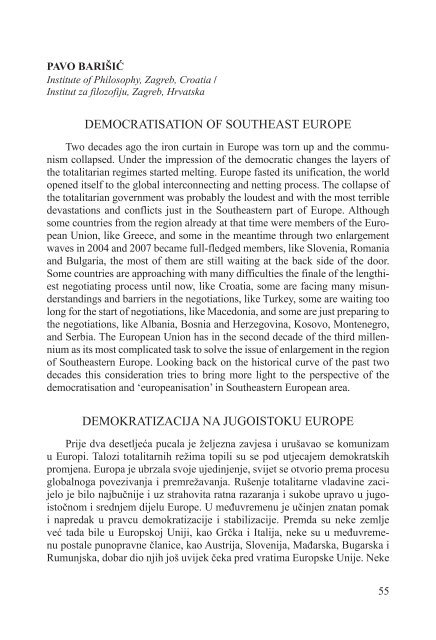Programska knjižica - Hrvatsko filozofsko društvo
Programska knjižica - Hrvatsko filozofsko društvo
Programska knjižica - Hrvatsko filozofsko društvo
Create successful ePaper yourself
Turn your PDF publications into a flip-book with our unique Google optimized e-Paper software.
PAVO BARIŠIĆ<br />
Institute of Philosophy, Zagreb, Croatia /<br />
Institut za filozofiju, Zagreb, Hrvatska<br />
DEMOCRATISATION OF SOUTHEAST EUROPE<br />
Two decades ago the iron curtain in Europe was torn up and the communism<br />
collapsed. Under the impression of the democratic changes the layers of<br />
the totalitarian regimes started melting. Europe fasted its unification, the world<br />
opened itself to the global interconnecting and netting process. The collapse of<br />
the totalitarian government was probably the loudest and with the most terrible<br />
devastations and conflicts just in the Southeastern part of Europe. Although<br />
some countries from the region already at that time were members of the European<br />
Union, like Greece, and some in the meantime through two enlargement<br />
waves in 2004 and 2007 became full-fledged members, like Slovenia, Romania<br />
and Bulgaria, the most of them are still waiting at the back side of the door.<br />
Some countries are approaching with many difficulties the finale of the lengthiest<br />
negotiating process until now, like Croatia, some are facing many misunderstandings<br />
and barriers in the negotiations, like Turkey, some are waiting too<br />
long for the start of negotiations, like Macedonia, and some are just preparing to<br />
the negotiations, like Albania, Bosnia and Herzegovina, Kosovo, Montenegro,<br />
and Serbia. The European Union has in the second decade of the third millennium<br />
as its most complicated task to solve the issue of enlargement in the region<br />
of Southeastern Europe. Looking back on the historical curve of the past two<br />
decades this consideration tries to bring more light to the perspective of the<br />
democratisation and ‘europeanisation’ in Southeastern European area.<br />
DEMOKRATIZACIJA NA JUGOISTOKU EUROPE<br />
Prije dva desetljeća pucala je željezna zavjesa i urušavao se komunizam<br />
u Europi. Talozi totalitarnih režima topili su se pod utjecajem demokratskih<br />
promjena. Europa je ubrzala svoje ujedinjenje, svijet se otvorio prema procesu<br />
globalnoga povezivanja i premrežavanja. Rušenje totalitarne vladavine zacijelo<br />
je bilo najbučnije i uz strahovita ratna razaranja i sukobe upravo u jugoistočnom<br />
i srednjem dijelu Europe. U međuvremenu je učinjen znatan pomak<br />
i napredak u pravcu demokratizacije i stabilizacije. Premda su neke zemlje<br />
već tada bile u Europskoj Uniji, kao Grčka i Italija, neke su u međuvremenu<br />
postale punopravne članice, kao Austrija, Slovenija, Mađarska, Bugarska i<br />
Rumunjska, dobar dio njih još uvijek čeka pred vratima Europske Unije. Neke<br />
55

















